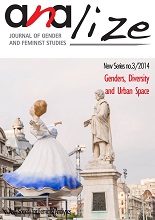Doing and Undoing Gender in Urban Spaces. The University Square Bucharest
Doing and Undoing Gender in Urban Spaces. The University Square Bucharest
Author(s): Diana Elena NeagaSubject(s): Gender Studies, Rural and urban sociology
Published by: Societatea de Analize Feministe AnA
Keywords: gender regime; city; toponymy; social memory;
Summary/Abstract: Doing and undoing gender is a well-researched theme mainly in the area of feminist studies, but how this process is reflected in different urban spaces still remains understudied, a fortiori in Romania. That is why the Romanian Society for Feminist Analyses AnA is implementing the project „Urban Discriminations. Gender Sensitive Active Citizenship Program”. Through its documentation and activism activities, the program will mark women’s active presence in the urban space, and will contribute to the identification of potential urban oppressive elements for diverse women by removing physical, functional and symbolic barriers, offering alternative narratives to the dominant ones and arguing for the need to adapt the urban space to the society’s contemporary requests of inclusion and respect of difference among people. In this context, in my paper I will present the data collected for a case study, namely University Square – Bucharest, a place with an important symbolic relevance for the recent history of our country. How women’s presence (absence), but also the presence of other minorities, can be captured in advertising, graffiti, statues and monuments, streets names or other types of urban manifestations in University Square is the main research question of my study. In order to do so I will first present a theoretical framework for understanding the way which our daily life area of living (the city) can be experienced trough gendered lens, starting from the assumption that sexual & gender differences in the production of urban space analysis is very important in understanding public life, social interaction and the construction of identities. Second, I will present the data collected in order to, last but not least, open a discussion about the reappropriation & reinterpretation of urban spaces in the process of more equitable socio-cultural production
Journal: AnALize: Revista de studii feministe
- Issue Year: 2014
- Issue No: 3 (17)
- Page Range: 28-49
- Page Count: 22
- Language: English

